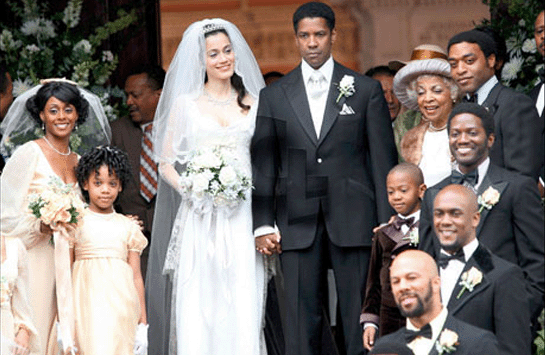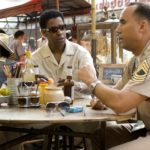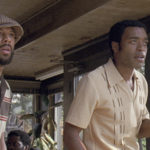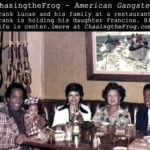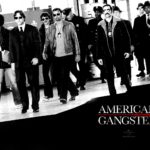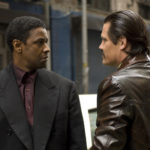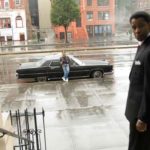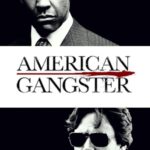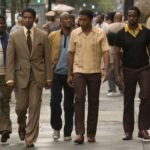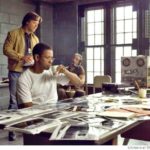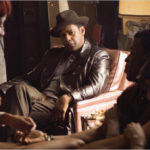American Gangster is Sir Ridley Scott‘s oeuvre to compete in size and scope with the masterworks of contemporaries Scorsese and Coppola, since all great directors have to take on the mob, or at least large scale organised crime, once at least.
Scott, you will recall, directed the likes of Alien, Black Hawk Down, Blade Runner, Gladiator, Thelma & Louise, Hannibal and The Martian. A formidable body of work, though for all Scott’s reputation you could understand if he felt maligned and not taken as seriously by comparison with the greatest directors of the age.
He perhaps wanted a film that could legitimately be regarded as his masterpiece, a movie to rub shoulders with the greatest, and as such took on a mega budget ($100m+), mega cast and mega egos (Crowe, Washington, Brolin, Ejiofor, Gooding, Elba, even a rapper called RZA, plus a cast of thousands, though it was veteran Ruby Dee who took the acting gong.)
Choosing Steve Zallian as scriptwriting sidekick was a good start, since the script zings and hums throughout. Harris Savides was another great choice, since his cinematography reflects Scott’s vision for a feisty and visually liberated Harlem with first-person action shots. Wikipedia notes: “Hand-held cameras were extensively used to depict a ‘guerrilla filmmaking’ style.”
Be in no doubt that Scott pulled off all the many technical feats of large-scale direction with aplomb, though whether his work will stand comparison with the greatest of the era only time will tell. In fact, it only picked up two Oscar nominations (the other being for Art Direction), in spite of the liberal praise scattered by critics and academies, This lack of recognition in spite of the fine words caused Scott much anguish and disappointment, I have no doubt.
Like Goodfellas American Gangster is broadly a biopic (see below for Wikipedia commentary on the accuracy), taking on a heavyweight game of cops and robbers between Harlem drug baron Frank Lucas and detective-turned-lawyer Richie Roberts, of whose respective careers more later. Like The Godfather trilogy it has the epic scale and gravitas to demand serious attention, almost at times Shakespearean if you can imagine an impeccably besuited Richard III selling his own brand of heroin on the streets of NYC.
It has shades of The Departed in that the police and the gangs are closer than you have any right to expect, with corrupt cops on the payroll, though that will be one of the familiar themes in this genre, along with a host of motifs that ring a whole peal of bells. Blow? Sex? Casual shootings? Casual violence? Revenge? Lashings of each, then some. Not quite Wolf of Wall Street, but then AG retains a touch of gritty street life rather than exploding totally into fantasy gangsterland.
The film covers Lucas’s opportunistic rise from no 2 in a neighbourhood drug gang in 1968 to running a vast empire, such that the money almost became an embarrassment (shades of Narcos, with Lucas in the Escobar role of gentleman gangster), through to a gracious fall in 1986, as the tenacious Roberts finally got the evidence to trap his man, his family, his gang, his sources – and 75% of the Narcotics Squad into the bargain.
That both are still alive, apparently living it large in retirement, and also both acted as advisors to the movie, tells you something. If there’s a moral, it’s certainly not that crime doesn’t pay – though the ironic nobility of gangsterdom is a notable feature in the work of both Scorcese and Coppola.
Through the action there are many large-scale choreographed scenes interspersed with small, intimate, breathy if not breathless moments of tension. The Shakespearean motifs repeatedly arise as the battle for power and turf wax and wane, with speeches made as mini-monologues to remind you of motives. For breadth, the action expands from Harlem to Vietnam as Lucas gets one step ahead of the game by importing pure smack directly from source and imports via US military flights during the Vietnam war, which even Roberts takes some while to catch up with.
There’s more than a little cat-and-mouse about the parallel lives of Washington’s Lucas and Crowe’s Roberts, though Washington steals most scenes with a swagger, while Crowe knuckles down into one of his broody strong-but-silent performances. While there are many fine performances on view (look out for Ejiofor and Gooding as well as Dee), it is Washington who stands out from the crowd, so you wonder what on earth the Academy was playing at by not nominating him (along with Zallian and Savides, as mentioned above.)
Perhaps the weakest element is that in over 150 minutes of playtime is that the pace drops, such that on odd occasions my attention wandered. One of the rare talents associated with this genre is to create a saga in which the viewer can retain the tension of multiple strands of storyline over a great many virtual years without losing track or ceasing to care about any. It is a mighty juggling act, though one or two balls were dropped along the way.
However, this does not detract too much from what is undeniably a fine and worthy movie. It is worth seeing, though in my final analysis is not a truly great or classic film. Nice try Scott, but there’s no doubt in my book you cornered the market for great scifi movies, way above Nolan – though others will disagree.
Accuracy of the film
In an interview with MSNBC, Lucas expressed his excitement about the film and amazement at Denzel Washington’s portrayal.[62] However, Lucas admitted to several news outlets that only a small portion of the film was true,[63] and that much of it was fabricated for dramatic effect.[64] In addition, Richie Roberts criticized the film for portraying him in a custody battle while in real life he never had a child. Roberts criticized the portrayal of Lucas, describing it as “almost noble”.[63]
Sterling Johnson, Jr., a federal judge who served as a special narcotics prosecutor for the United States District Court for the Eastern District of New York and assisted the arrest and trial of Lucas, described the film as “one percent reality and ninety-nine percent Hollywood.” In addition, Johnson described the real life Lucas as “illiterate, vicious, violent, and everything Denzel Washington was not.”[65] Former DEA agents Jack Toal, Gregory Korniloff, and Louis Diaz filed a lawsuit against Universal saying that the events in the film were fictionalized and that the film defamed them and hundreds of other agents.[66] The lawsuit was eventually dismissed by US District Judge Colleen McMahon. While McMahon noted that the intertitle that appears at the end of the film, stating that Lucas’ collaboration led to the arrest of many corrupt DEA agents, was “wholly inaccurate”, in that Lucas’ cooperation did not lead to the convictions, and admonished that “It would behoove a major corporation like Universal (which is owned by a major news organization, NBC) not to put inaccurate statements at the end of popular films”, she stated that the film failed to meet legal standards of defamation because it failed to “show a single person who is identifiable as a DEA agent”.[67]
Many of Lucas’ other claims, as presented in the film, have also been called into question, such as being the right-hand man of Bumpy Johnson, rising above the power of the Mafia and Nicky Barnes, and that he was the mastermind behind the Golden Triangle heroin connection of the 1970s. Ron Chepesiuk, a biographer of Frank Lucas, deemed the story as a myth. Associated Press entertainment writer Frank Coyle noted that “this mess happened partly because journalists have been relying on secondary sources removed from the actual events.”[68]

